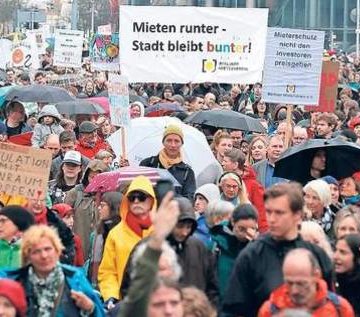- About
- Topics
- Story
- In-Depth
- Picks
- Opinion
- News
- Donate
- Signup for our newsletterOur Editors' Best Picks.Send
Read, Debate: Engage.
The world almost ended again last week. Not to downplay events in Syria, where Britain, France and the U.S. united to take down some of the Assad regime's chemical weapon facilities (prompting fears of Russian retaliation), but today I'd like to talk about something more parochial. I'd like to talk about life in Berlin.
I live in Berlin, and have done since 2013. As an educated, British writer with access to a new, international market of jobs, I have many cultural and social capital at my disposal. I may not be wealthy, but I do have the possibility to leave the city and work in a completely different country — France, for example, or Italy — if the need arose. I could find work at a startup, or an ad agency; I could even go to one of those countries and only speak English, like I selfishly and thoughtlessly did in Berlin until 2014, when I finally started learning German. The point is, I could go to a different city and have the opportunity to thrive. I am mobile. I have options.
However, not everyone is so lucky. Investors in Berlin have flooded the city with money, inflating renting prices astronomically and threatening a substantial portion of the city's population. Their argument (and one which is floated in the media) is that there are so many people like me in the city (mobile, working in new industries, moneyed) that it's natural to inflate prices by up to 400%. This is a false argument.
Firstly, non-German nationals make up roughly only 15% of the population: not all of them are oil barons. Secondly, the effect of immigrants on a city is normally economically beneficial. Thirdly, investment, development and speculation are the primary causes. I do admit however that my liking for good coffee probably has helped more than one hipster coffee meets art-space to remain open.
The real problem is investment and speculation. The real problem is rapacious capitalism. The real problem is greed. If anything, it's surprising Berlin was able to be 'poor but sexy' for so long — after the wall fell, the state conducted mass sell offs of property stock to private owners. But in another sense, it's entirely predictable. Money always smells easy prey, and finally, the sharks' nostrils are flaring.
But people are fighting back. Florian Hille is a good example. A Berlin resident, he's taking a stand against Deutsche Wohnen (the private company which owns his, and many other buildings). They are trying to raise rents permanently through the neat little loophole of modernisation. Under this law, a company must improve a property if they want to drastically raise rent. However, all costs can be passed on to the tenant, and the rent, once raised, can stay raised. Florian is taking Deutche Wohnen to court, and if he wins, he can strike a serious blow to investors and developers looking to exploit their tenants.
You can support his campaign here.
The city of Berlin is a a place of endless fun. There is something here for everyone, from partygoers to parents. This is what makes Berlin beautiful, that anyone can live here and everyone is accepted. Let's not turn this into yet another playground for the rich. Let's not blame migrants and young people for something out of their control. And let's support the cities we live in.
Image: 23,000 people mobilised on the weekend against rising rents in the city.
